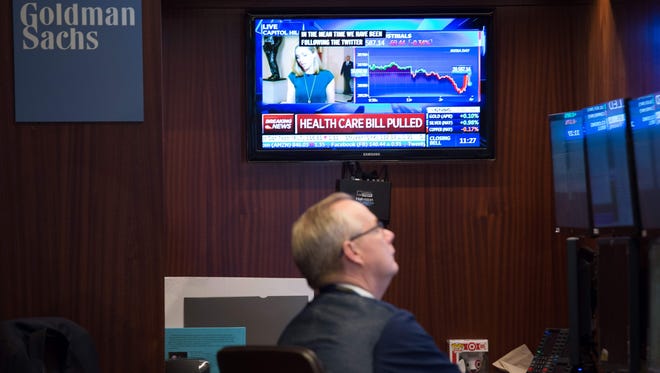Why shocking news shouldn't derail your investments
Trump firing the FBI chief and its comparison to Watergate. North Korea and nukes. The president’s stalled economic agenda. Brexit and the threat to the European Union.

While the fire hose of unsettling news runs 24/7 on cable news and social media, not all of it has what it takes to tank stock markets. And that’s why investors must be careful not to overreact to the crisis of the day, Wall Street pros say.
“STOP watching TV,” says Brian Belski, chief investment strategist at BMO Capital Markets. “Fear sells and investors and the media are way too short-term focused.”
Adds Alan Skrainka, chief investment officer at Cornerstone Wealth Management: “Listening to the 6 o’clock news gets investors off track.”
Take some of the recent nerve-racking headlines and the false alarms they set off. The market was supposed to crash after Brexit last June. It didn’t. It was supposed to take a big hit when President Trump was elected. It didn’t. It was supposed to crater when the Fed started raising rates. It didn’t.
Instead, stocks kept going up. The Dow Jones industrial average is 14% higher than it was on the day Trump won the White House vote, despite predictions that his win and unpredictable style would sink markets. And the recent flap in Washington over the firing of FBI director James Comey has caused a minor 0.3% retreat.

Due to intense competition and "the desire to stand out," Skrainka says, media coverage has become "more and more shocking," which often creates "unsupported hysteria."
The risk for investors is making rash buy-and-sell investment decisions based on startling, unexpected headlines — like the day in late March when House Republicans had to pull their bill to replace Obamacare — that might not have a lasting effect on the market. (The House passed its new health care bill May 4 on its second try.) News that portends bad financial outcomes often is wrong, prompting mistakes from those who react.
"You can be scared out of the market when you should stay in, or lured in when you should be cautious," says Brad McMillan, chief investment officer at Commonwealth Financial Network.
What news, then, is worth getting worked up over when it comes to protecting your nest egg?
News that hints at real trouble in the economy, such as headlines back in 2008 during the financial crisis that identified major credit problems at the nation's biggest banks.
"Any news that causes a loss of confidence in the economy or the institutions that influence it can potentially hurt the markets," says Bill Hornbarger, chief investment officer at money management firm Moneta Group. "I would not include in that category," he adds, "the president firing a senior adviser or someone being dragged off a plane (like the United Airlines incident)."
Investors are better served by closely following news that could signal a coming economic downturn, adds McMillan. The reason: "Bear markets (or down markets) come when we have a recession." That means focusing more on business news related to corporate earnings, interest rate decisions by the Federal Reserve and the health of Main Street workers.
Markets are forward-looking, while news is about the past, which is less useful, less action-oriented information to investors.
"The nightly news is a recap of what already happened; it is not a firm predictor of the future," says Anthony Sabino, a law professor in the business school at St. John's University. "People tend to think the worst, that the next day will bring more bad news. That's not necessarily so."
He added that millions of viewers might rush out and take the wrong actions.
"You need to stay calm," Sabino said. "That keeps your investments on track, and healthy."